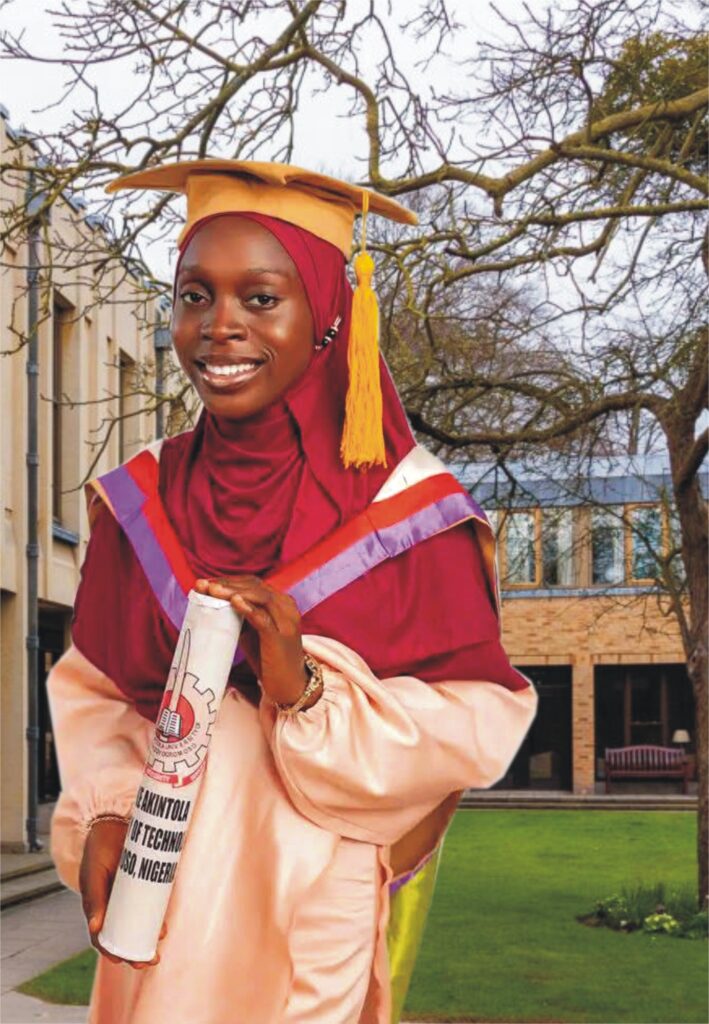At 23, Badirat Adeduntan graduated with a first-class degree in Science Laboratory Technology and emerged as the overall best graduate of the Ladoke Akintola University of Technology, Ogbomosho. She shares with GRACE EDEMA the highs and lows of her academic journey and the near heartbreak of a result mix-up
Why did you decide to study Science Laboratory Technology?
To be honest, I didn’t choose it because it was my dream course; I planned to study either Medicine or Nursing. I intended to apply for Medicine, but I later changed school to Ladoke Akintola University of Technology and opted for Science Laboratory Technology instead.
Why weren’t you given admission to study Medicine?
I chose the University of Ibadan as my first choice. I sat the post-UTME and scored, I think, 49 out of 100. Their cut-off mark was 50, so I didn’t meet the requirement.
What year was that?
That was in 2019.
When you applied to LAUTECH, what did you score?
I scored 240 in my UTME, and for LAUTECH’s post-UTME, I got something within the 20s out of 50. I’m not exactly sure how they calculated the final score, but I know I exceeded the required cut-off for the course I chose. That was how I gained admission.
Would you consider going back to study Medicine or Nursing?
No, I plan to continue with Science Laboratory Technology.
Now that you’ve graduated and you’re the best in your school, what’s the next step?
I plan to undergo my internship first and then proceed with the National Youth Service Corps. After my service year, I intend to go for my master’s degree. I could go for my master’s anywhere. If Allah wills, it could be in Nigeria or abroad.
What were the major challenges you faced on your path to academic excellence?
I faced a lot of challenges. School had its highs and lows. One major challenge was financial constraints. I don’t come from a wealthy background. My parents were able to pay my tuition, but there were times when feeding was difficult. I had some tough moments, but I pushed through.
So, how were you able to cope with those tough times, especially when you didn’t have food, yet still had to study, prepare for exams, and attend classes?
I just had to keep going. I had to encourage myself and manage whatever I could find. Sometimes, I would go to my friends and ask for food, and they would share with me. After that, I would go to class and continue to study.
Did you benefit from the NELFUND loan or apply for it?
No, I never applied for NELFUND.
What were the practical steps you took that led to your academic excellence?
I would say I read a lot. I was very consistent with studying. I attended night classes regularly; sometimes I would go from class during the day to my hostel for a short rest, and then back to night class again. It became a routine. If I started night class on a particular day, I would keep going every night. That dedication to constant studying helped me.
What time would your study sessions usually run?
I would go to my class by 9 pm and return to my hostel around 6 am. Sometimes I would take a short nap—maybe one or two hours—just at the table, right there in class, inside the school premises.
Did you maintain such a study routine every day?
Not every day. Usually, about a month after resumption or once lectures had properly begun. This study routine never affected me in class. I was able to stay focused during lectures.
So, what advice do you have for Nigerian students who want to succeed academically?
Nigerian students should always embrace hard work, consistent reading, prayers, and self-awareness. Knowing oneself is important. For example, I discovered that when I write things out at night, I tend to remember them easily. So, I maximised that—reading and writing at night worked best for me. It’s about understanding what works for you and sticking to it.
What would you say was the most challenging experience you had during your time in school?
The most challenging moment for me was in my first semester, 300-level. When I received my results, I saw that I scored 23 in a three-unit course.
When I saw the result, I broke down in tears. I was devastated. The next day, I couldn’t hold it any longer. I went to the course coordinator and explained everything to him. I also spoke to the lecturer in charge of the course.
I told him, ‘Sir, I did well in the test, the exam, and the practicals. There’s no way I could have failed this course.’ He agreed to look into it, collected my details, and promised to check my scripts. It took some time, but eventually, they found my actual score was 81A. It was likely an error in inputting the score. Thank God, I followed it up.
That moment was very tough for me. When I saw that result and added it to my other results, my CGPA dropped significantly. I kept praying, asking God to let the lecturer find my script and correct the score. It took a while, but eventually, he did, and the correct result was uploaded. I think that was the most challenging part of my time in school because I almost rewrote the course, which I passed very well.
What experience has this taught you?
Results from 100-level to 500-level, and they must be extremely careful when inputting scores into the system. After entering results, they should always cross-check for possible errors, especially for students who appear to have failed.
Many students went through a similar experience but didn’t get the chance to correct their scores. Unfortunately, some of them had to retake the course in the following session. That’s why accuracy and proper verification are very important.
What can you say about the student–lecturer relationship?
It varies. Not all lecturers are the same. Some are very approachable. You can walk up to them, ask questions, and they’ll listen and assist you. They’re friendly and supportive. But others are quite strict. With those, even going to their office feels intimidating. So, the relationship depends on the individual lecturer. Some are open and helpful, while others are more reserved and stricter.
What advice do you have for lecturers?
I would advise lecturers to show more compassion and be a bit lenient with their students. They should remember that they are also parents, and if they truly love their profession, they should look out for the well-being of their students. If a student comes to them with a problem, they should be willing to offer guidance and, where possible, help find a solution.
What kind of support did your parents give you throughout your academic journey?
My parents were very supportive, even though we are not wealthy. They always did their best for me, and I’m very grateful to them for that.
To other parents in Nigeria, I would say: please support your children. Pay their fees, encourage them, and treat all your children equally. Don’t show favouritism just because one child seems more brilliant than the other. Even if you don’t have much, try your best to take care of them. That support makes a big difference.
What do your parents do for a living?
My dad is a farmer, and my mum is a trader.
Culled from PUNCH







